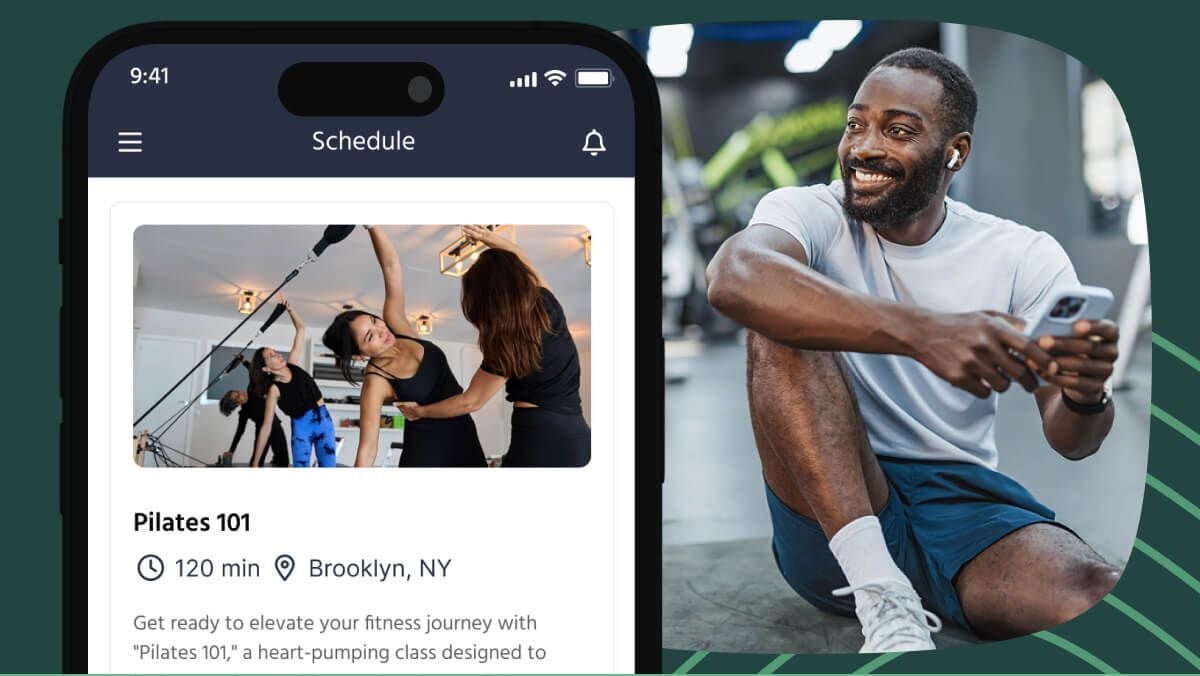Facebook and Linkedin groups are very popular places for gym and studio owners, new and existing, to ask their peers and business coaches questions they have about their business. What better a resource than your peers who are experiencing similar instances and situations in their own businesses as well as coaches and professionals who have walked your same path before?
While many people come into the groups to ask questions specific to their business, the majority of the time, the answers given can actually be applied to many different types of businesses. So while you may have come to just get your own questions answered, most likely your participation in these social media groups will also give you new ideas and inspiration that you can take back to your business.

With dozens of Facebook groups and Linkedin groups with anywhere from a handful to thousands of members, it's easy for very important questions and answers to get lost in the mix.
In this guide, we break down some of the most popular questions business owners ask in the top fitness business Facebook groups. You'll see what several members and participants had to say for each question, and even walk away with answers you might currently be looking for. Let's check them out.
Offering new clients a free trial

Whether to offer new members and clients a free trial to encourage their sign up is a big discussion between business owners. There are many who see it as a great way to get new people in the physical and virtual door and others who would rather steer potential new members to signing up right out the gate.
The debate over whether free trial offers are a good approach or not is the main reason new business owners often inquire about whether they too should or should not offer a free trial. Here’s what several owners and coaches had to say.
Dan Salcumbe, owner of the Institute of Personal Trainers:
Absolutely. I had a ton of free time so offered a ton of free trials. I got a ton of paying clients this way and it catapulted my business. When I had less time, because I had more paying clients, I simply stopped offering free trials. The most successful personal training businesses I see utilise a long term model and have recurring clients for years. My advice would be to test it. Every tool works when it's in the right hands.
Giovanni Petrucci, owner of Giovanni Petrucci PT:
If you're busy and have very little free time you probably can't / don't need to offer free trials. But if you are just starting out, are not that busy or you're trying to grow your business then there is no shame in offering some taster sessions. They don't have to be actual training sessions but can be a consultation/screening/ let me show you a couple of practical examples of how I work.
Chris Lupton, owner of Innovate Fitness:
The entire focus of the discussion above is misplaced. It's not a case of “do you offer…….free trials.” The focus should be “what do you OFFER in order to get attention and people to potentially want to work with you”. Netflix offer a free trial. DFS offer a half-price sale. Dominos used to offer 'get it in 30 minutes or it's free.' Insurance companies offer 'if you find a cheaper quote we'll match and it refund the difference.' In a world that's hard to stand out, having an offer of some sort to help you stand out, and reduces or removes the risk to the buyer, is usually a good idea.
Listing prices on your website

One of the most popular questions we have seen asked in Facebook groups is whether or not to list your prices on your website. If there was ever a debate between owners, this is one of the largest topics that get many responses on both for and against listing your prices. Here is what several owners and business coaches had to say about listing your prices on your website:
Liam Thompson, owner of Internet Fit Pro:
Personally, I wouldn't. It's essentially a sales, marketing tactic to drive people to a conversation and start a sales process on the phone. The rationale as a business is that it means you have a chance to explain the value before giving someone the price.
Jamie Aphro, owner of BFAST Fitness - Personal Trainers Birmingham:
If someone asked me prices, I'd tell them. Our trial price is on the website but not all our membership fees. Some people don't switch off straight away when looking at the 'cost' vs the value which is a shame as it doesn't give someone the chance to see that it is actually worth it. But for courses and such I agree it's a total turnoff and I don't bother usually.
Roxy Sullivan, a nutritionist and owner of Bristol Personal Training:
So I don't have prices and I make a healthy profit. I know that clients hear the price before they see the value. Unfortunately, people will spend more than they need on phones, cars and hair extensions but begrudge spending more than what they think PT should cost. I have so much more on offer than PT, it's a comprehensive coaching service. I need to assess them to see if they're a good fit and if I can help them before I can explain what I offer and how much it may cost them.
I'm earning 4x more now than when I advertised pricing, and I charge more. Of course, I'm not saying that's because my prices are hidden but my onboarding process is very slick and everybody needs a consultation before paying me any money. If I told you a phone was £1k you'd laugh in my face and yet people are paying for it. If I told you'd I'd solve your biggest problem what price would you put on it?
Katka Chromá, F45 Training Croydon UK:
Yeah I agree with all of the above. While I do get a bit annoyed too when I can't see the price straight away I do think its good to have a conversation, even if at the end of it you simply don't want to spend that much. I think it's different with subscriptions etc as you kind of have to reveal the price as people get a service, like Lift the Bar, Mac Mentoring lab, etc. But with courses, especially coaching and marketing courses and PT it's important to explain the value of the service and perhaps have a chat, trial of it before you reveal the price as it helps to then "justify" the price tag to the people.
In the end, it then comes to people either being able to afford your price or not. I just had a few trial PT sessions and even at the end did not reveal prices and told them I would immediately send a list of options and had 3 people sign up, two did not because they are financially tied up to other things. When I revealed prices upfront, I had way less success.
Simon Wellsted, owner of The Integrated Fitpro:
It depends on whether you consider you are selling a commodity product - session price per hour etc OR whether you are selling a programme or service to deliver a bespoke client solution. The latter is far better of course and it doesn't make sense to put prices on a website in this case. The problem with commodity (per session) selling is that you end up in a price war and people shopping around on price which is the last thing you want.
Gary Mendoza, owner of Stages of Change:
I agree, all my prices are on my site. If people contact you then at least you know price is not going to be a barrier to making a sale. If they decide you're too expensive then they were unlikely to purchase in the first place.
What to do when clients disappear after emailing your prices

One of the biggest headaches and disappointments is when potential new clients reach out to inquire only to then disappear after you respond with your offering and pricing. If you have been in this situation before, you're not alone.
Here's what some coaches and owners recommend doing if that happens:
Jonah Cockshaw, owner of Grow Your Fitness Business:
If people are leading their decision making with price then I'd recommend not giving them a price right out the gate. 9 times out of 10, it won't matter what price you give them because it'll be too high and they'll lose interest. But it'll always be 'too high' based on what other people are offering… they have no idea what you offer or how it's better and different.
You need to know more about their goals, challenges, preferences etc so you know if they're even the right kind of client for you… then you need to lead their decision making by highlighting how your service will help them achieve their goals and overcome challenges.
People typically don't buy the best or cheapest product… they buy the one they're most confident in. If you just give them a price then they can only be confident in how much money they're spending and absolutely nothing else. You could argue that you're doing them (and yourself) a disservice by simply stating a price without more of a conversation first.
I'd say something like this “Hey, thanks for reaching out! If you've got 15-20 mins today or tomorrow I'd benefit from knowing more about you and your goals. This'll help me know that I can help you. If I can, we'll discuss pricing options on the same call. I can send a link to my calendar if you like?”
Fitness business coach, Kate Martin says:
Ideally ask them Q's to find out more about them, as you don't know if you can help them & book a call to speak to them.
Body transformation coach, Baron D Stock:
If the price is the most important factor then maybe they are not for you!! Stand by your quality and price. Don't be afraid to value yourself according to the market, it's up to the client to be able to AFFORD you, not the other way round!
Matthew Taylor, owner of Biomech Fitness:
I explain to them what they're getting with each product first, to set an idea of the value and then reveal the prices for them. This way they understand what PT really is before the price reveal. As most people who've never had PT assume it's just £X/60mins of your time, as they don't understand how much homework we put in for them to be successful in these sessions.
Liam Thompson, owner of Internet Fitpro:
Your goal should be to get them on a call to explain what their goals are and then give them the price on the phone so you have a chance to explain your value.
Example: "My prices depend on your fitness/body goals and how quickly you want to achieve them. Are you free to get on a quick call and discuss and see how I can help you?"
Sports Massage Therapist Rob Docherty Massage:
When I started out I got told not to reveal my prices, as it can scare away potential clients. I found this to be a load of crap. Tell people your prices upfront. If they disappear then you've saved yourself wasted time when they inevitably give you the old "I'll get back to you" later in the process.
Starting your business with a booking system

Keeping costs low, especially in the beginning is something new business owners strive for. This oftentimes means that beneficial tools such as management software get overlooked because of their bad reputation for costly prices and being too complicated to figure out at the start. Important things that they can use to manage early admin and bookings, collect payments, and build a strong customer experience from the start get overlooked if they aren't free or cheap.
Here's what several gym and studio owners with both experiences using booking software and no experience using booking software have to say about whether or not to start with a system in place:
Lee Gooch owner of LGPT Bootcamp says:
When I first started out I created a Google spreadsheet that allowed my customers to book themselves in. I have however been using TeamUp for nearly three years which makes it all easy for me to take payments and allow customers to book in via the members' app or my TeamUp website.
Claire Winter, Lift the Bar Head of Operations:
I've always gone with manual booking. It's a personal choice, usually based on availability and funds, but systems aren't a necessity. In some cases, I used pen and paper rather than a spreadsheet. Depends on numbers and how changeable the attendee list is.
Successful marketing strategies

There are numerous successful strategies for marketing your fitness business. The same thing can work for some businesses, while something completely different works for other business models. So why not ask what others are doing and decide what you think works for your business? Practice makes perfect! Here are some examples of successful fitness business marketing strategies owners and coaches have tried:
Karl Muir owner of PT Mentor UK:
Conversations, posts, and giving value on social media. Landing pages, email grabbers, free downloads (ebooks, price guides etc). Facebook page and group, Google My Business page. These are just a few of the things you should be doing.
Rob Stockwell Newey, owner of RobNewney Personal Training:
I have my own training area at my home for my clients. I have no budget for advertising so social media and word of mouth is the most important for me. Firstly be good at your job, know your clients and post useful content when you can.
Gill Cummings-Bell, director of Drummond Education:
On top of social media, newsletters, tasters and launch sessions says we use other social media groups within your town or local area so we can reach that wider audience, mums groups, sports groups, etc, as many as you can and also use the Council website and newsletter as we joined their business group. We also invited some key journalists from some local sites and groups and well-followed blogs to partake and they promoted it.
Advice for new trainers and business owners

There are a lot of very important lessons new business owners learn at the start that prove very helpful to the people that follow in their footsteps. This is why those people will often ask existing owners and fitpros for the things they wish they knew early on that could prepare them for success and help them avoid big mistakes. Here's what they had to say:
Dan Salcumbe, owner of IPT:
Do more, think less. Someone out there who is way less qualified than you is out there killing it because they took action instead of seeking the perfect strategy.
To which several other trainers responded below, “This!”
Andy Wake, founder of Boxercise Worldwide:
Compete on quality NOT on price.
Karl Muir, owner of PT Mentor UK:
Know how it is you're looking to work with. Understand how to solve their problems. Create content, products and services to help solve those problems. Build-in systems and processes that help turn prospects into clients. Don't undersell yourself.
Sarah Hodgson, owner of On The Rye Fitness Community:
Gaining experience with different types of clients. It's easy to say “make sure you know your niche or ideal client” but until you've worked with a bunch of people you won't know for sure. Then don't be afraid to get rid of or say no to people you don't want to work with!
Robert Leat, owner and online coach at Robert Leat Fitness:
Take money upfront, charge monthly, train lots of different people initially to help you figure out what you want to specialise in and who you want to work with.
Facebook groups for fitness business owners
To get started participating and engaging in the top Facebook groups for fitness business owners, here is a list of free and paid groups to join:
Free:
- Certified Personal Trainers Network
- Online Personal Trainer Group
- UK PTs
- Gym Owners Business Network
- CIMSPA
- Personal Trainers UK Network
Paid or with membership:
Thanks for reading! Do you have a question about running your business you’d like to ask us? Ask it in the comments below!









